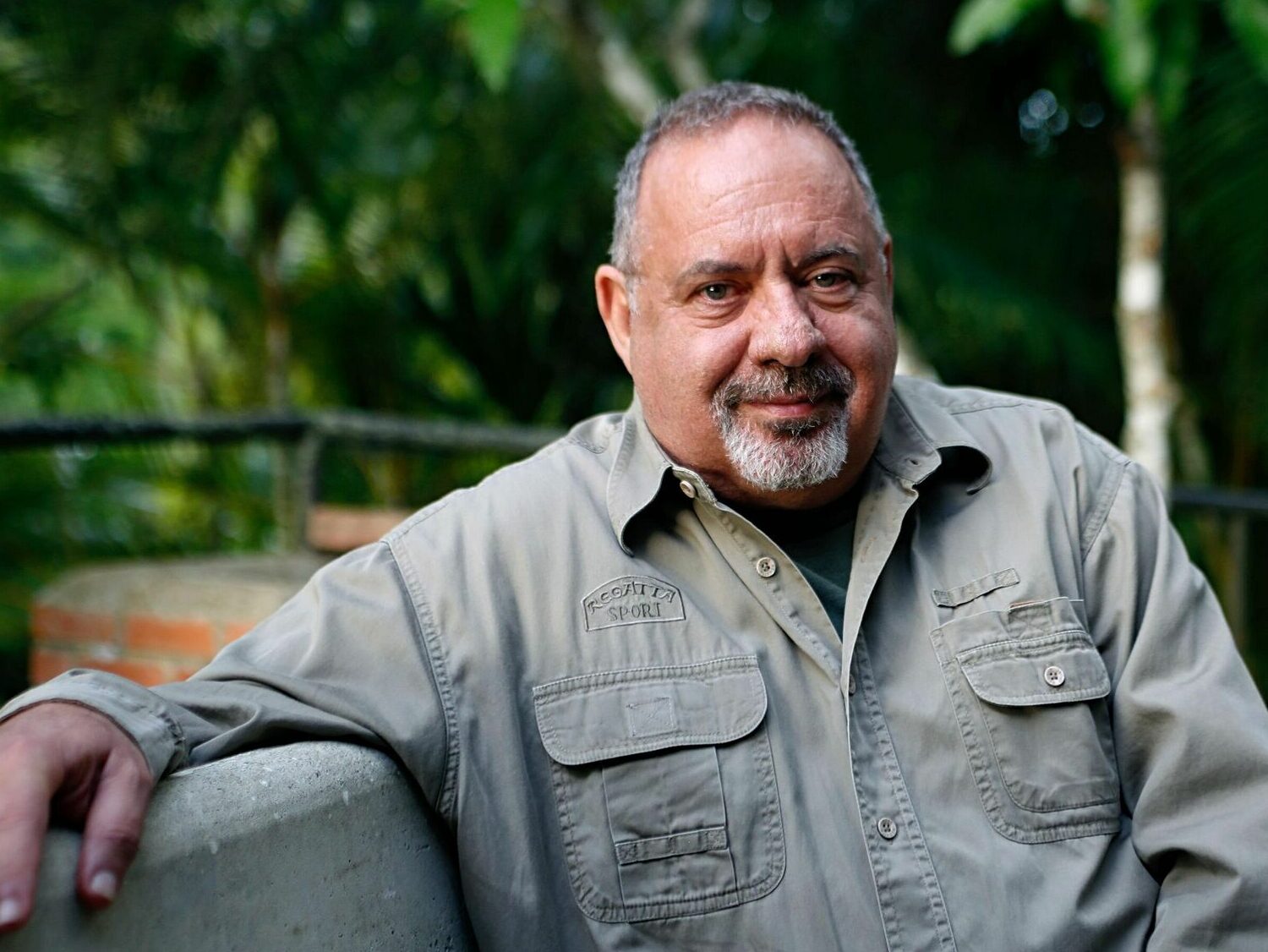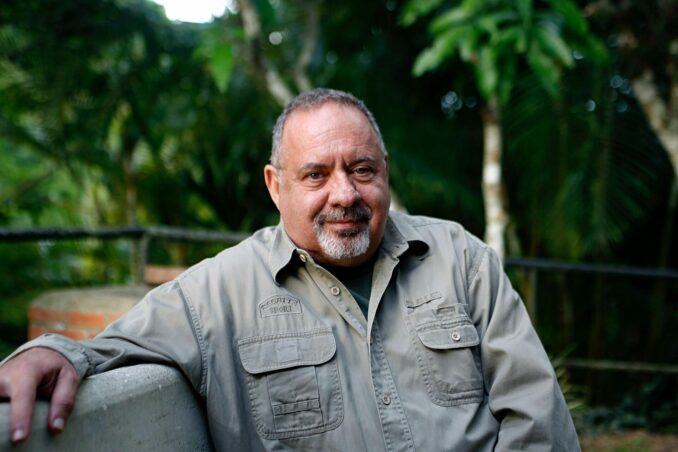

Sergio Rodriguez Gelfenstein, the author.
Nov. 1. The spectacle staged by the United States and its NATO ally Norway with respect to Venezuela marked a turning point last Oct. 17 when an agreement was signed between the government and the opposition.


Sergio Rodriguez Gelfenstein, the author.
It is a spectacle because it is ridiculous to negotiate outside Venezuelan territory (in Mexico and Barbados), which was done only because there is no U.S. Embassy in Venezuela and the U.S. needs to closely control its Venezuelan-based employees who “negotiate” on its behalf. When has it ever been necessary for two legal parties in conflict to negotiate abroad when neither of them is clandestine or persecuted at home and when there is no war going on in the country?
That the dialogue between Venezuelans needs to take place in Mexico and Barbados is an expression of the deep distrust Washington has for its local cronies, whom it needs to “control from close quarters.”
The purpose of this “negotiation” was to ratify the real negotiation in order to give it a legal framework. The real negotiation was the one held discreetly and confidentially between the Venezuelan government and the United States government.
The U.S. asked that the talks be kept secret while deciding how to “sell” to U.S. public opinion that it is dialoguing with a government that it characterized as a dictatorship and that it swore to defeat in any way it chose, while considering all options “on the table.” Washington asked that what had been agreed upon be kept in reserve until the “best moment” to make it known. That time came, of course, before the Biden administration’s timetable.
U.S. interventions fail
At this point, the United States could already confirm that the whole arsenal of instruments used to overthrow the Bolivarian government failed spectacularly. Let’s see:
And it failed. All these actions are documented and can be the object of study for those interested in knowing what has happened and is happening in Venezuela.
Having exhausted all these procedures, the U.S. intends to create a new Guaidó, but now it is trying to give a legal appearance to the procedure. At the international level, given that the new progressive governments of Colombia and Brazil have refused to take part in the actions against Venezuela, the U.S. is using the weak regime of Guyana, led by an elite with a neo-colonial and groveling mentality that has betrayed its great founding leaders — Cheddi Jagan and Forbes Burnham — to create an international conflict aimed at justifying a military action under the leadership of the Southern Command of the United States Armed Forces, thus serving the large Western energy transnationals.
Despite having discovered that the Venezuelan opposition, besides being an expression of mediocrity and shameful ignorance, has lied to it for years, announcing “the imminent fall of Maduro,” the United States is — just as in Ukraine and Israel — clinging to interventionist and infiltrationist practices by giving support to forces that represent the most retrograde thinking in the country. Its attachment to an outdated Cold War logic has been more powerful than the quest to understand a reality that is heralding the birth of a new world.
But that is not the reason why the U.S. negotiated with Venezuela. It has no qualms about squandering U.S. taxpayer money, like an uncontrolled hemorrhage, in an attempt to stop the course of history.
Two sides to the deal
There are two sides to this apparent rapprochement with Venezuela.
First, the deep economic crisis that is hitting the United States, particularly in the area of energy.
It should be recalled that only two weeks after the start of Russia’s military operation in Ukraine, a U.S. delegation, at the highest level in more than a decade, arrived in Caracas, headed by Juan Gonzalez, the White House national security adviser.
Hidden behind an alleged interest in freeing some Americans imprisoned in Venezuela, the real purpose of the visit was to open the doors of the country to establish a line of communication at a time of uncertainty regarding the scope of the conflict in Ukraine.
But what it could have foreseen would fall short, the sanctions against Russia boomeranged and are affecting the aggressor more than the target. A report last week revealed that the strategic oil reserve of the United States is at its lowest level since 1983.
The truth is that today the U.S. has less than half of the crude oil reserves it had 10 years ago. At the moment, these reserves amount to 350 million barrels. To give you an idea of what that means, in the last two years, Biden released 270 million barrels from the U.S. reserves in order to lower prices.
He could not do that today. That is why the U.S. needs Venezuela’s oil to flow unrestricted through the market. This is the first rationale that explains the reason for the negotiations.
The second motive driving the U.S. government’s action has to do with the way it is selling to the U.S. public that, as I said before, it is negotiating with the “dictatorship” it swore to destroy. As is well known, U.S. public opinion is uniformed, manageable and manipulable, and only matters as a vote-producing machine. However, if it does not achieve that goal, it can also be manipulated to accept a fraud such as the one that occurred in the 2000 presidential elections. Then, Al Gore was robbed of the election after an agreement between the elites and the institutions of power.
In such a way that, sustained by the habitual backwardness of that public opinion, this situation, which is political in nature, can be transformed into one of an electoral nature; that would present a problem for the U.S. administration.
These two factors accelerated the development of the negotiation process in Venezuela.
Thus, Washington forced the Venezuelan opposition to go to Barbados and accept everything that the U.S. government proposed because everything that was proposed had already been previously agreed to between the governments of Venezuela and the United States. The opposition was not given the possibility to express its opinion, only to comply.
That is why the issue of disqualifications was not discussed. As usual, once again the United States discarded its lackeys, — whether individuals, organizations or countries — when these no longer served it. Just ask Guaidó.
Now, Washington is selling it in such a way that it seems that, to the extent that the Venezuelan government and the opposition came to an agreement, there is no point in maintaining the sanctions because they achieved their goal of forcing Maduro to give in. Everything is false; the truth is the opposite. Washington reached an agreement with Caracas and ordered the opposition to abide by it.
The assertion that Maduro gave in makes it obvious that — to some extent — politics, if it is to be done within the frameworks of the representative democracy that prevails in Venezuela, obliges the parties to give in on something. But what has not been negotiated is sovereignty, territorial integrity, and the will of the people to defend their future — and in that, Venezuela has had a firm defender in President Maduro.
No yield on principles
We cannot speak of yielding in pejorative terms. On the contrary, yielding is a symbol of greatness … and of power. One yields in tactical matters while being firm and immovable in the defense of strategic objectives. This is the essence of successfully carrying forward the long-term goals that lead to the revolutionary transformation of society.
For this, it is necessary to know how to build the correlation of forces necessary to produce the changes. In the midst of a brutal imperialist aggression, this process is slow and difficult. The government has yielded in negotiating with the democratic opposition because it is a constitutional requirement.
Reaching agreements that favor the country and the people is nothing negative. On the contrary, it is what all Venezuelans want. But of course, the terrorist opposition which is now trying to create an artificial leader by deceiving the people and that is also questioning the sovereign interests of Venezuela in the Essequibo [area disputed by Venezuela and Guyana], has no capacity to debate, only to abide by what is dictated from the North.
The people of Venezuela resisted and triumphed, showing once again that victory is the prize of those who fight and refuse to submit. That is what we learned from Simón Bolívar and Hugo Chávez, and that is what sustains us to face and win the battles of the future wherever they are fought — at the negotiating table or on the battlefield.
*A Venezuelan international relations expert, Sergio Rodriguez Gelfenstein was previously Director of the International Relations of the Presidency of the Bolivarian Republic of Venezuela, his country’s ambassador to Nicaragua and an adviser for international politics for TeleSUR. You can follow him on X (formerly Twitter): @sergioro0701. Translation: John Catalinotto
The following call, “Gaza cries out to you – A global solidarity week to support…
Ever since the Donald Trump/Elon Musk administration took the reins of power in late January,…
The following is a letter from Workers World Party to the Workers Party of Korea…
Statement of the anti-imperialist Citizens’ Pole organization in Panamá, issued April 10, 2025. Translation: John…
Philadelphia Philadelphia’s transit system, the Southeastern Pennsylvania Transit Authority (SEPTA), released a budget on April…
By Gary Wilson The following is a guest article published first on April 10, 2025…